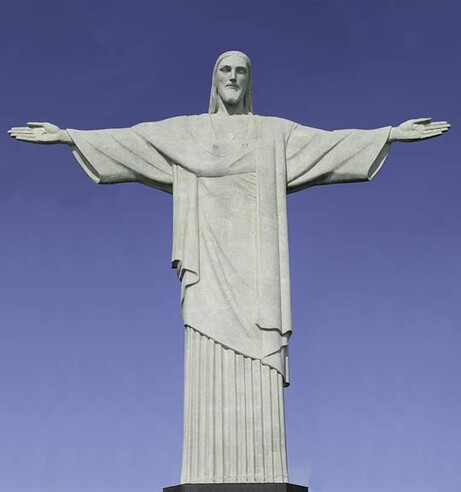Jesus of Nazareth – why his teachings are different.
SPIRITUAL TOPICS > Jesus of Nazareth
Jesus of Nazareth - his original teaching

Why the Teachings of Jesus and those of the Christian Churches do not correspond
In our culture, we predominantly have Christianity, the largest religion in the world. Its believers are presumably convinced that they live their lives largely in the sense of the great Truth-Bringer. But if we take a closer look at the teachings of Christ, we quickly come across fundamental contradictions to the existing dogmas, which put a considerable strain on our need for consistency and justice!
Two thousand years ago, Christ came and brought His word. Since then, it has been exposed to human interpretation, lack of understanding, and even more or less intentional distortion by most of the religious communities that have come to bear his name, and the unquestioning acceptance of it by indifferent or coerced believers. This raises the big and legitimate question of whether there are any similarities at all with the original teachings of Jesus Christ, or whether there isn't now a vast gulf between them. Is it not the state of peacelessness in the world, and also in Christianity, that leads us to the conclusion that we have by no means followed the serious demands of Christ's teachings to this day?
This article is intended to encourage people to rediscover the convincing logic of Christ's teachings and to deepen their so-called faith with knowledge according to the Laws of Creation. Among other things, they address the following questions:
- Who is Jesus, and why did he come to Earth at all?
- Is he really the Son of God?
- Were his miracles beyond the Laws of Nature?
- Was his death on the cross the most important thing, or was it his teaching?
- Why does today's interpretation of his teaching contradict all the Laws of Creation, therefore all logic?
- Was the brutal, agonizing crucifixion really necessary
- Was this wanted, granted or even demanded by God the Father?
- Was Judas Iscariot's betrayal therefore part of the plan of salvation?
- Can this bring salvation, under the exclusion of the 5th commandment “Thou shalt not kill”?
- Is the vicarious atonement by a completely innocent person compatible with justice?
- Is the redemption that allegedly took place 2000 years ago actually showing itself in any form at all? etc.
This topic is not about a philosophical-theological debate, but about questions of existential importance. It touches on our own responsibility for our path and our fate, based on the Laws of Creation.
So who is Jesus of Nazareth?

Jesus of Nazareth and the Christian Faith
Why the life of Jesus, his Teaching and his Death on the Cross are completely misinterpreted today
Please be honest with yourself: What image of Christ do you bear inside you? Is it the image of a hypersensitive, soft and yielding young man who forgives sins in the twinkling of an eye, who seeks with miracles the curiosity, the approval and the favour of men. And in the end, as a completely innocent man, Jesus of Nazareth goes to an agonizing death, which his all-loving father allegedly demands as atonement for the sins of mankind?
Or is it a man who is both warm and serious, of the highest format and dignity, filled with wisdom, who had to come at all costs if mankind, who was spiritually completely lost, was to be helped once more in order to save it from doom? Who came in love to explain to her the wrong actions and to show her the right way? Who, at the same time, strictly points to the consequences that must result from a further refusal to do good, in other words, a continued abuse of free will? In short, which necessarily links any possibility of redemption, as a timelessly valid demand, to the fact that we human beings change considerably and live by his teachings?
Presumably, as a result of the teachings that are distributed among us, the first picture will be by far the most widespread about Jesus of Nazareth, and the second the absolute exception.
Almost every reflecting Christian may have faced several times in his life the question "Who is Jesus really, and why did he come?" or similar questions of faith, for which he had no plausible answer. Just the basics of the religions that call themselves Christian are logically no longer comprehensible in the interpretations and must therefore actually be believed blindly.
Jesus of Nazareth taught exactly the opposite of a blind faith! In simple, comprehensible images and parables, he proclaimed a doctrine of the greatest clarity, logic and consistency, based on unchangeable foundations that uniformly run through all of the Creation from the highest Heights. For divine perfection is inseparably connected with uniform, logical and therefore for us also recognizable laws. They make it possible for us to understand the order of Creation, so that, with good will, we can consciously integrate ourselves into it! And it is precisely the comprehensibility of his teaching, which he has brought with the greatest sacrifice and danger to life, that is the most important thing for us, so that we can carry out the necessary changes of wrong behaviour ourselves and steer our free will back into constructive paths. Provided that we are prepared to do so at all - for that too is a free decision of our will that has to come from us!
The following contributions show that Jesus of Nazareth, as the bringer of truth from the highest Heights, was misjudged more than anybody else to this extent! His teaching, which was logical in every respect, and his message of peace to the people was misinterpreted clerically in 2000 years, distorted and often reversed into the opposite. Unfortunately, considerable misinterpretations already began with the great apostle Paul and continued on and on.
As a result, today we have religious teachings that contradict in all essential points the originally lovingly clear and strict doctrine of Christ according to the Laws of Creation, so that only a distorted picture remains of the once outstanding clarity and purity. If it were otherwise, we would have the peace and also the inner harmony which the teaching of Christ inseparably carries within itself. The world and the way people treat each other would be completely different than it is today!
All Christian teachings rightly emphasize again and again the perfection of God, which logically also applies to God's Son, as whom they recognize Jesus Christ himself. But perfection excludes any form of arbitrariness and a violation of the Laws of Creation - that is, precisely what unfortunately results from the teachings of Christian religious communities, if one takes a closer look and examines it. This in turn leads to the conclusion that the doctrine of Christ and that of the churches do not coincide in all its essential matters. Those who are prepared to open themselves up to this perhaps bitter but absolutely salutary conclusion and to follow it will find completely different, new and conclusive paths to Jesus of Nazareth!
You are warmly invited to gain an entirely new and logical perspective on the life, doctrine and the exceedingly agonizing death on the cross, unwanted by God the Father, of the great Bringer of Truth.
Other available topics:
The Laws of Creation - the basis of Christ's teaching and of all processes in Creation
Life after death - why our existence does not end and how it goes on according to the laws of nature
This website is under construction – but here’s a preview of the topics you’ll find:
Why Faith must unite with clear Spiritual Knowledge - Why true faith is not what is commonly understood by Christians.Jesus of Nazareth - How his clear and pure teachings have been significantly distorted over the past 2,000 years.The Laws of Creation - God's will and the perfect driving forces behind all events.New: The Grail Message – In the Light of Truth - An introduction to the first lectures of the great explanation of Creation. What does it say?New: Reincarnation - The Enigma of Rebirth - and its Solution. The Key to Meaning and JusticeLife after Death - What happens next according to Natural Laws, and why viewing death more naturally can be deeply liberating.Suicide - Why the desired End of our Existence cannot happen according to Natural Laws.Enigma Coronavirus - Is the coronavirus a random mutation, a "punishment from God," or something entirely different?Translated from the original German site 'spirituelle-werte.de', partly with the help of AI. For all inaccuracies and stylistic weaknesses I ask for your sympathy.